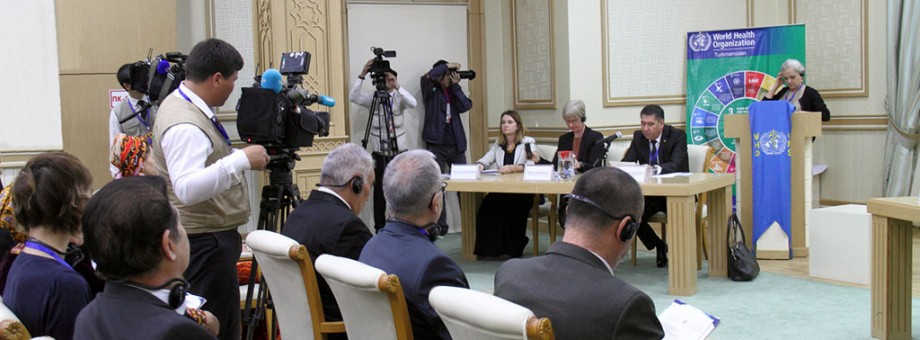Positive practice of Turkmenistan in combating of non-infectious diseases is discussed during the briefing

The UN building hosted the briefing for the mass media under International regional European high-level Conference of the World health Organization “Prevention and Combat against Non-infectious Diseases”, which is to be held in Turkmen capital on April 9 – 10.
Personnel of the WHO country office in Turkmenistan, Ministry of Health Protection and Medical Industry of the country, international experts as well as public persons and political scientists took part in the meeting.
It was announced that the agenda of current European WHO conference provides the discussion of fulfilment of the obligations on starting of the activities on the country level following from the UN General Assembly 2018 Political Declaration on Non-infectious diseases. Information about the programme of coming conference, short review of the situation in the world regarding spread and prevention of non-infectious diseases and modern achievements of Turkmenistan have been presented at the briefing.
Special mention has been made on progressive trends of our country in tobacco control for the period from the I European Ministerial Conference of the Who in the context of the provisions of Health – 2020 policy in Ashgabat in 2013.
Two years ago, Turkmen leader signed the Resolution, having approved 2017 – 2021 National Programme of the Implementation of the Framework Convention of the Who on Tobacco Control. The Programme is aimed at the combating against smoking and is to provide efficient measures for turning of Turkmenistan to the country free of tobacco by 2025.
High results have been achieved in our country under the implementation of the WHO Framework Convention on Tobacco Control in our country. according to the experts of international organization, the ratio of smokers in Turkmenistan was 3.4 percent in 2018, which is the best indicator not only in European region but in the world as well.
Relative activities involving all structures including medical and educational facilities, public organizations, mass media, which are taken on permanent basis, give positive results. In this regard, the Law of Turkmenistan, which define legal, organizational and economic foundations of the state policy in the sphere of prevention from harmful effect of alcohol and aimed at protection of health of citizens, formation and assertion of healthy life style in the society, is very current.
In addition, according to the WHO recommendations on the main risk factors, National Programme of prevention of harmful impact of alcohol for 2018 – 2024, National Strategy of improvement of physical activity of the population for 2018 – 2025 and National Programme of protection of psychic health of the population for 2018 – 2022 have been adopted.
Care of health of the nation is a priority of the state and society development in Turkmenistan, the main direction of the policy of President Gurbanguly Berdimuhamedov. The Sustainable Development Goals and the 2030 Global Agenda, in which health protection occupies an important place, became an integral part of the Programme of social and economic development of the country in 2019 – 2025.
According to the specialists, positive practice of Turkmenistan in combating non-infectious diseases can be applied in all countries of European region and its implementation on regional level supports efficient use of huge capabilities of health protection sphere and will be very important in improvement of international cooperation.
The programme of the conference includes the subjects of expansion of international partnership and study of new forms of cooperation for fulfilment of the obligations in the country level, integration of the prevention, treatment and monitoring of mental disorders and other non-infectious diseases to the system of health protection, achievement of target indicators in relation to cardiovascular disease and diabetes and expansion of the scale of implementation of cost effective solutions of prevention and control of non-infectious diseases, reduction of modified risk factors of these diseases related to unhealthy nutrition.
Perspectives of the achievement of target indicators in alcohol consumption by 2025 and 2030, goals in the spheres of non-infectious diseases and the SDGs regarding the access to medicine, prevention of obesity, epidemiological monitoring of non-infectious diseases will be discussed at the forum.


 NACHRICHTEN
NACHRICHTEN